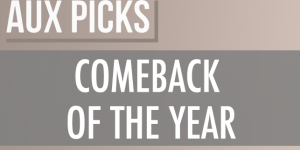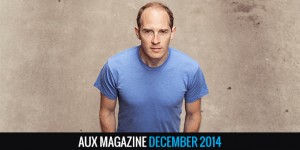Caribou's 'Our Love' is Dan Snaith's ode to contemporary dance music
by Josiah Hughes
December 22, 2014
Interact with a 360-degree photo, on-stage at a Caribou soundcheck.
Musicians often like to conceal their influences, particularly if they’re contemporary. Most artists would much rather pretend to be inspired by an age-old auteur, or give off the illusion that they pulled an idea out of thin air, than admit that they were inspired by their peers.
The world of electronic music is much different. Perhaps in part because it’s a relatively newer subsect of music, there’s an inherently contemporary undercurrent, and musicians engaged in the genre are more willing to embrace timely, era-specific sounds. Electronic music is often a cultural conversation.
Our Love is the seventh full-length album by Dan Snaith, and the fourth to bear his Caribou moniker. It’s one of the best albums of his already impeccable career, a true sonic achievement. And while it’s unlikely that it’ll sound dated anytime soon, it’s certainly an album that sounds like 2014.
“I guess that’s the contradiction, that Our Love both sounds my own, but that sounds like it’s contemporary at the same time,” he says.
Photo by Tony Makepeace
Dan Snaith is speaking to me over Skype from his home in London. He moved to the UK in 2001 to complete a PhD in mathematics (a study he describes as “a kind of elegant otherworldly thing where you’re kind of immersed in this thing that has no relation to anything else that anybody is interested in”), and has remained there ever since. Aside from a tendency to say “loads of” instead of “lots of” in conversation, there’s little to demonstrate his British-ness. “I still very much feel Canadian and that Canada’s home, and I still get back to Canada quite a lot,” he says.
Still, he discusses his youth with a hint of melancholy. “I spent the first 23 years of my life living in Canada and I’m nostalgic about so many phases of that,” he admits. “For example, living in Toronto, going to University of Toronto and putting on little club nights there, that was such a wonderful, wonderful time. Also growing up out in the country, outside Dundas [Ontario] and being a kid where I was out running around in the woods. When I think about my daughter now, I’m so nostalgic. In some ways I feel guilty that she’s not having that. It was such an idyllic way to grow up.”
Snaith and his family are perfectly settled in Britain, and while he insists that calling London home hasn’t influenced his music too much, he points to his Polaris-shortlisted 2010 masterpiece Swim as a product of time spent in London’s then-booming bass scene. “It was very much a symptom of me being in a particular environment, like meeting all these guys like Joy Orbison, Floating Points, the Hessle Audio guys, Ben UFO, Pearson Sound, and becoming friends with them. James Holden was a big part of it. And that was so much to do with what was going on in London at that time.”
For Our Love, Snaith set out to utilize the trends of today, specifically, the icy synths of club music and the larger-than-life production of modern R&B. “When I first started making this record, I thought it was going to sound much more influenced by contemporary R&B production,” he says. “Those kind of glassy digital sounds, chopped up vocal samples — which you can hear some of on the record, this hyper-real, hyper-digital sound that’s very prevalent in contemporary electronic music and R&B.”
Those sounds are certainly in there, from the single-note dub and heartfelt singing of “All I Ever Need” to the cut-up vocals and melodic synths of “Dive” (which is the closest Caribou has come to exploring the OVO Sound on record) or the dreamy, confessional balladry of “Second Chance.” But while these new ideas are certainly prevalent, it’s hardly a straightforward rip of contemporary sounds.
“I spent the first 23 years of my life living in Canada and I’m nostalgic about so many phases of that.”
“Later on in the process of the record, it was kind of warmed up by a lot more analogue sounds,” Snaith admits. “The whole analogue, warmer soul music sounding side of things was completely unintentional and just came from me listening to lots of that music with my little daughter because it’s nice to put those records on when you’re hanging out with somebody who’s barely a year old, and have them hear that music,” he recalls. “I didn’t really think about that having any effect on the record I was making, but looking back afterward I could hear more of those sounds. Whereas, the idea of those contemporary R&B sounds being in there, that was explicitly intended.
“In the end I’m kind of glad I didn’t make that record because it’s so ubiquitous now, that kind of super hyper-realistic synthesized two-dimensional glossy environment,” he continues. “I’m not sure I had something, particularly, to add to that.”
Snaith approaches each album with a painstaking attention to detail. For Our Love, he started with between 800 and 900 rough, 30-second song sketches. “It’s getting worse a little bit,” he admits. “The last album, it was a little less than that. I always make loads and loads of ideas. I’m not suggesting they’re finished tracks in any way, but just a 30-second loop with a beat and a bassline and a harmony and melody or something like that. I make three or four of those every day, pretty much, during the time that I’m making a record, then I come back to those and see which ones stick and only work on the ones that retain some kind of excitement after letting them sit for a little while.”
What makes an idea stick is harder to pinpoint, but Snaith boils it down to “a search for a new kind of sound, a sound that will kind of define the record that I’m working on.” While his technical ideas certainly play a role in what makes it to the next stage of development, he’s also on the hunt for humanity. “It’s whether they make me melancholy or they reflect something that’s going on in my life and have that kind of very fundamental, emotional connection,” he says of the tracks that make the final cut. “It’s best when those two things line up nicely, with the kind of technical side sounding fresh to me, but also the emotional side being there. But it’s the emotional thing that keeps drawing me back to tracks to work on them.”
Another thing that factored in to Our Love’s creation was Daphni, Snaith’s club-ready, techno-oriented side project that he focused on after the release of Swim. The project was born from Snaith’s interest in DJing around London, and eventually culminated in 2012’s Jiaolong, an album that “was never supposed to be released.” Snaith describes it as “more simple, straightforward, uncluttered music,” adding that “most of the tracks are just a big sample, a synthesizer melody, a drumbeat and a bass line, and a couple of sound effect kind of sounds.”
The Daphni album (which was also longlisted for the Polaris Prize) informed Our Love in myriad ways. For one, it got Snaith thinking about dance music in a club atmosphere. “I would be hesitant to play any of [Our Love’s] tracks in a DJ setting, they’re not necessarily structured that way,” he quickly qualifies, “but it made me aware of all of those ideas, when things should build and how they should drop. DJing so much, which is how the whole Daphni thing came about the last few years, you get a very good sense of how things work functionally as dance music.”
Daphni also taught him to embrace the idea of simplicity. “When I first started releasing music I was so keen to show everybody, ‘Look I can do this, look I can do that.’ It was a way of kind of dealing with insecurities about being critiqued by people — I had to make this music prove itself in some kind of technical sense so that people can’t say, ‘Oh this guy’s just a chancer who doesn’t know what he’s doing.’”
“Nowadays I don’t feel the need to prove myself in that way,” he continues. “I kind of know what I can do and what I can’t do, and there’s certainly plenty of limits to what I can do. If something works and is super simple, I don’t feel the need to make it elaborate or decorate it or whatever. It can just work.”
In 2001, under the Manitoba moniker, Snaith release his debut full-length Start Breaking My Heart, a quaint IDM album that sounded, well, very 2001—full of clicks and cuts, gentle bleeps, and bubbly digital sounds. “Start Breaking My Heart very much was a record of its time, and looking back now I think of that as a strength,” Snaith admits. But his follow-ups mostly reject the sounds of the time, instead dabbling in the psychedelic pop sounds of the ’60s and ’70s. Those influences are spread across 2003’s Up In Flames, 2005’s The Milk of Human Kindness and much of 2007’s Andorra (which won the 2008 Polaris Music Prize). It was an incredibly successful time for the artist, but he now claims he was playing it safe.
“I think I was always playing it too safe by relying on, ‘Oh yeah, people are always going to like the sound of The Zombies and the Beach Boys, and this will appeal to them.’
“When I was making records like Andorra — that sounded like 1960s pop records even though it was made in a very different way — I was thinking, ‘I know how this will sound in the future, because those sounds have already had some time to settle,’” he says. “I think I was always playing it too safe by relying on, ‘Oh yeah, people are always going to like the sound of The Zombies and the Beach Boys, and this will appeal to them.’”
“Reflecting on those records later, that was a failing of mine, a weakness. All of the people whose music I loved from the past were trying to make music that was very contemporary or very forward-looking. I think you should be willing to take that risk. You get it catastrophically wrong, and 10 years later everyone thinks wow that was a big mistake, but otherwise it seems like a kind of regressive tendency to just be looking back, and it’s also particular of our age.”
The framework for the future actually kicked off with Andorra’s sprawling final track, “Niobe,” which Snaith admits was the start of the trajectory that lead to Swim and Our Love.
Our Love succeeds as a record that both defined and was defined by 2014, but it’s also a release that ties together everything Snaith has been working toward. Because of that, it’s hard to imagine where he’ll go next. First, of course, he’s completing a world tour, where Our Love’s songs will once again evolve thanks to the help of Snaith’s full band. Then, he’ll start from scratch and start sketching out his next record.
“My daughter’s off to preschool now, so during the day I’m sure I’ll be working away on music,” he says. “But also it’s nice to feel that I’ve just released a whole bunch of music and I can enjoy the process of starting again.”
“I just always want to be making music. It’s the thing I love the most.”
by New Canadian Music
Click to view larger graph
In a lot of ways, 2014 has been the best year of Caribou’s career—and he’s only really been active for half of it. In the world of streaming, Our Love and its accompanying singles have, by a wide margin, performed better than any of his past releases.
Of course, part of this can be attributed to the simple fact that platforms such as Soundcloud were only just being born when his 2007 LP Andorra came out. But even when you combine past numbers from YouTube and Last.fm, Dan Snaith has never had as many people streaming his tunes online as of this moment. What’s more, the numbers paint an interesting picture of how people are using different platforms differently to consume his music.
Soundcloud—far more a track-by-track listening experience—had spikes of nearly half a million plays a week for both June single “Can’t Do Without You” and the August-released “Our Love”. And though the numbers have inevitably declined since this time, he’s still averaging around an impressive 100,000 plays a week.
As for the album itself, Our Love made a strong impression across many platforms, including Last.fm, Rdio, and YouTube. What’s especially cool to see is how the numbers have sustained themselves far better once the album was released, as compared to Swim or Daphni LP Jiaolong. Even though the numbers on Rdio are more modest, it’s clear that many of their listeners have been spending time over October and November getting to know the record as a whole.
It’s an interesting study in an artist who straddles two worlds: on one hand, the single-heavy culture of dance and house; on the other, the album-centric tastes of art pop. Caribou’s ability to engage both comfortably make him a perfect fit for the way we listen these days.
Tags: Music, Cancon, Featured, Interviews, 2014 in review, AUX Magazine, caribou, Polaris Music Prize








